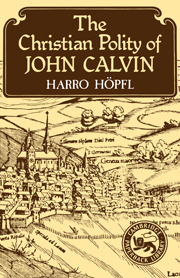Book contents
- Frontmatter
- Contents
- Preface
- Note on sources, orthography, notes and translations
- Introduction
- 1 The training of a lawgiver
- 2 The Institution: the first version
- 3 The first public ministry
- 4 Reconstruction
- 5 The Institution of 1543
- 6 Geneva and Calvin, 1541–64
- 7 The civil order of a Christian commonwealth
- 8 Political morality in the thought of Calvin
- 9 The laws and mores of a Christian commonwealth
- 10 Unfinished business: a speculative summary and postscript
- Appendix I Calvin's conversion
- Appendix II Predestination
- Notes
- Bibliography
- Index
- Cambridge Studies in the History and Theory of Politics
Appendix I - Calvin's conversion
Published online by Cambridge University Press: 24 October 2009
- Frontmatter
- Contents
- Preface
- Note on sources, orthography, notes and translations
- Introduction
- 1 The training of a lawgiver
- 2 The Institution: the first version
- 3 The first public ministry
- 4 Reconstruction
- 5 The Institution of 1543
- 6 Geneva and Calvin, 1541–64
- 7 The civil order of a Christian commonwealth
- 8 Political morality in the thought of Calvin
- 9 The laws and mores of a Christian commonwealth
- 10 Unfinished business: a speculative summary and postscript
- Appendix I Calvin's conversion
- Appendix II Predestination
- Notes
- Bibliography
- Index
- Cambridge Studies in the History and Theory of Politics
Summary
An examination of Calvin's conversion is not essential to the argument of this book, but has become a kind of test of academic virtù in Calvin studies, and in any case the gap between Calvin the humanist and Calvin the evangelical author of the Institutio ought to be filled.
It is perhaps appropriate to begin by distinguishing between the conversion experience itself and the sequence of theological and intellectual positions which terminated in Calvin's emergence as an evangelical. The character of the former, aside from its inherent inexplicability, was itself a principal subject of evangelical faith. Accounts of it can therefore be expected to conform to a predefined pattern, especially when the purpose of such accounts, as in Calvin's case, was primarily didactic rather than autobiographical. As to the latter, since conversion was to evangelicals the direct action of God, the human mediations and stages preceding it were of distinctly secondary interest. We must therefore beware of accepting as history what was at the very least accommodated to a theological pattern. The fons et origo of this pattern is ultimately St Paul, but a more immediate source is the Confessions of St Augustine. Luther's Freedom of a Christian intimates the existence of such a model, and Calvin may be presumed to have been familiar with this work. In any case, Paul was the centre of the evangel for them both.
- Type
- Chapter
- Information
- The Christian Polity of John Calvin , pp. 219 - 226Publisher: Cambridge University PressPrint publication year: 1982

